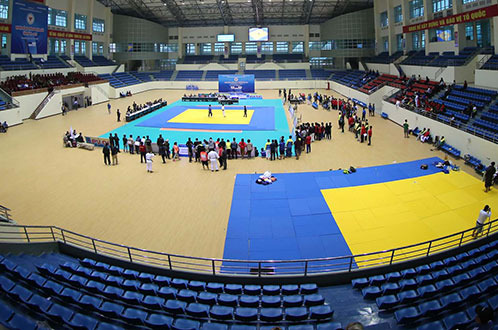Incumbent and former sports officials have stressed the necessity of organizing the National Sports Festival in Vietnam, currently held every four years, while underlining that changes are needed to avoid waste and formalism.
The ‘diseases’ of the multi-sport event have actually appeared and lasted over several recent editions, including overspending on building facilities in host provinces, the formalism in reports of achievements by participant teams, and the failure to boost the sports training spirit among the masses.
The 2014 National Sports Festival, which wrapped up last week in the central province of Nam Dinh, was the seventh edition since national liberation in 1975.
Le Buu, former chief of the General Department of Sports and Physical Training, told Tuoi Tre (Youth) newspaper that he saw much formalism in Nam Dinh when he was invited to the festival last week as a visitor.
The festival was organized from December 6 to 16 in Nam Dinh, with some other venues in neighboring localities such as Ha Nam, Hanoi and Thai Binh in the north.
If authorities fail to lead the festival to meet the targets of encouraging sports training in the masses as well as selecting and training elite athletes, the event should not be held any more, he insisted.
Provincial authorities use sporting achievements by their athletes after each national sports festival to report to their superiors on the overall accomplishments of sports training in their province.
However, many provinces do not have a sports training program and just spend money to attract athletes from other localities onto their team before a festival and free them right after that.
That has led to ‘virtual’ achievements, and incorrect allocation of state budget for sports investment in such provinces, said Nguyen Hong Minh – former chief of the Department of Elite Sports Training under the General Department of Sports and Physical Training.
For many provinces, a sports festival is merely a chance for local authorities to ask for the state budget to build large-scale projects which often sit empty after the end of the event.
The 7,500-seat Ha Nam Sports House in the northern province of Ha Nam is an example. The facility, located on an area of 120 hectares just two kilometers from the provincial capital of Phu Ly, was built at a cost of over VND1 trillion (US$48.1 million) from the state budget of the central and provincial governments to host just taekwondo matches and several volleyball games at the 2014 festival.
The national sports festival should be divided into different smaller competitions as other nations do, for example a beach festival, indoor and martial arts festival, and festival for chess to avoid constructing big sports houses to gather thousands of athletes at the same time, proposed Mai Ba Hung – deputy director of the Ho Chi Minh City Department of Culture, Sports and Tourism.
Festival organizers should also pay attention to attracting sponsors, Hung added.
Nguyen Dinh Minh, head of the Vietnamese national short-distance track and field team, asked the festival organizers to consider when the event should be hosted.
He wondered why the festival must be held at the end of the year when international competitions have already ended. This is not the peak time for athletes to compete.
Big projects
The construction of sports facilities for the 2014 festival surpassed the plan that Prime Minister Nguyen Tan Dung approved last year.
According to the plan, a provincial sports house must not have more than 3,000 seats in the stands, but the northern provinces of Ha Nam and Thai Binh built 7,500-seat and 5,000-seat sports houses for the 2014 festival.
Ha Nam and Thai Binh were granted VND300 billion ($14.4 million) each to build a sports house but the former spent over VND1 trillion ($48.1 million) and the latter VND650 billion ($31.3 million).
In an interview with Tuoi Tre, Thai Binh’s deputy chairwoman Cao Thi Hai confirmed that the Thai Binh Sports House will be used at its full capacity to avoid waste.
|
Le Buu, the former chief of the General Department of Sports and Physical Training, voiced his concern in an interview with Tuoi Tre that worrying problems have emerged in sports management in Vietnam. A sports festival is meant to boost the sport training spirit among the masses, but such events have failed to attract people to watch and cheer the competitions. In addition, participant provinces have to ‘cope’ with the festivals by ‘borrowing’ athletes from other localities to report their achievements. The sports festival aims to select elite athletes but they are often organized at the end of the year when they are not in peak fitness. |
Like us on Facebook or follow us on Twitter to get the latest news about Vietnam!




















































